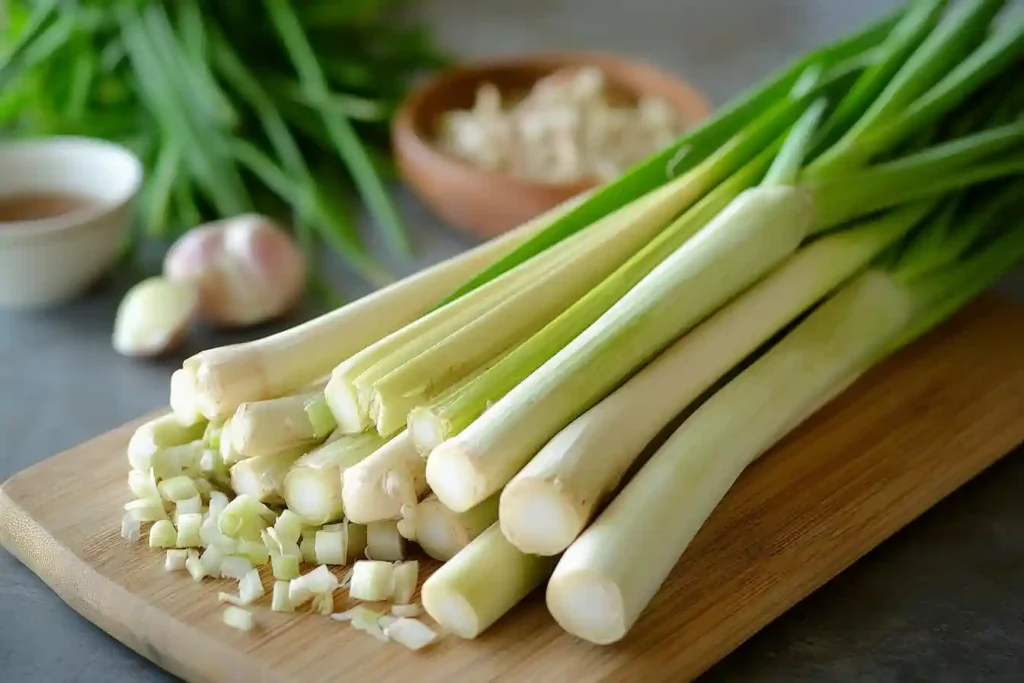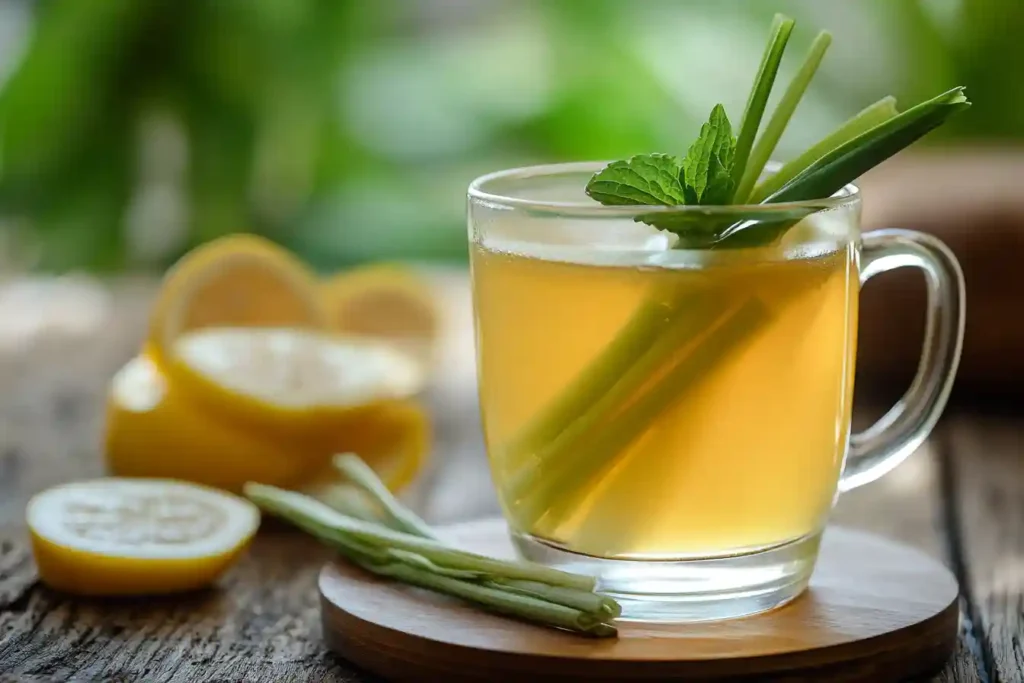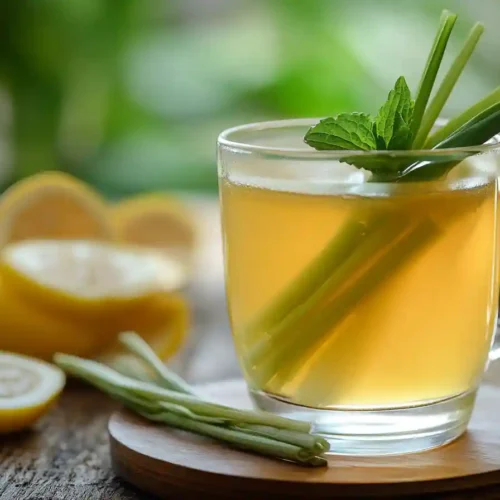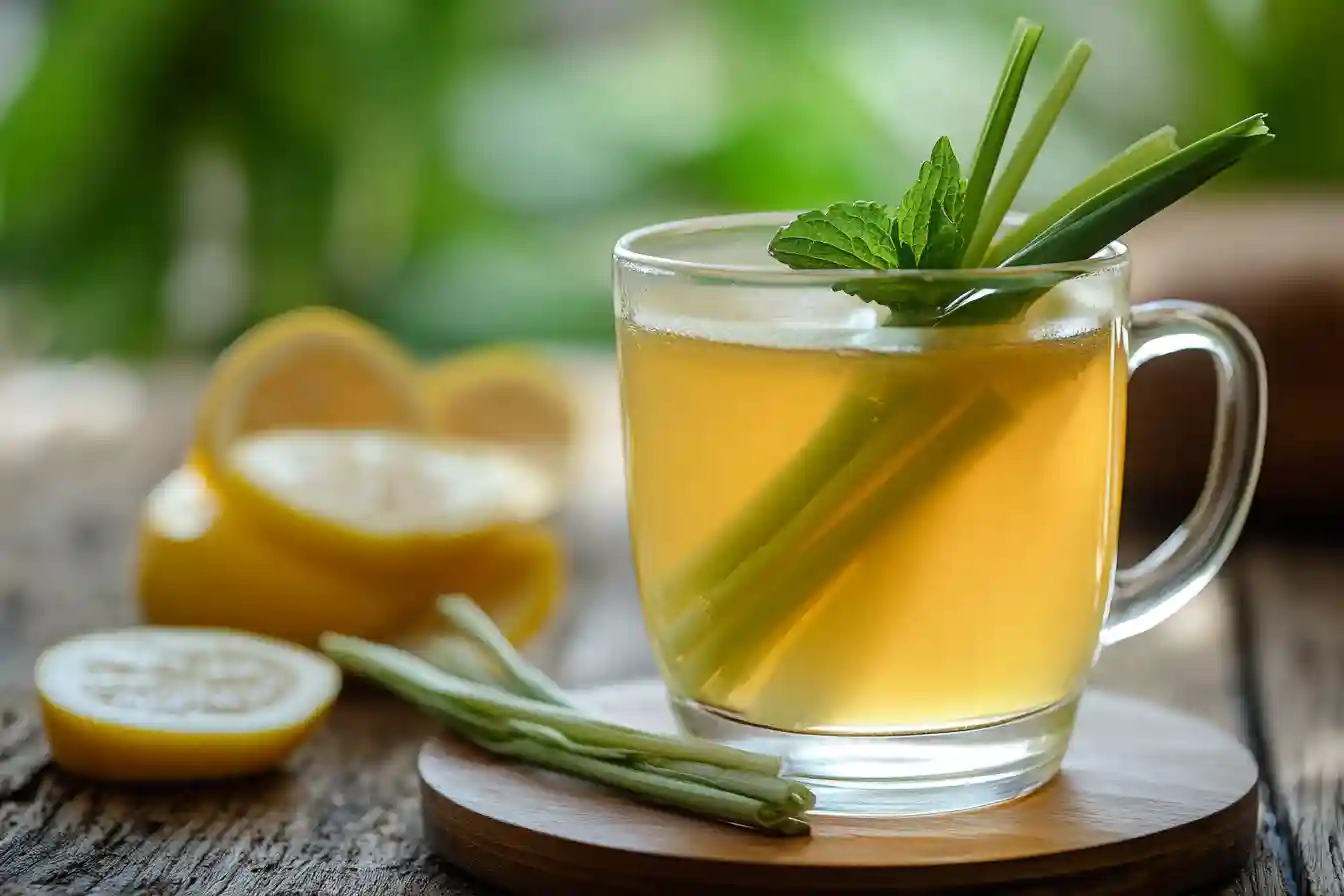Lemon grass tea is a popular herbal infusion made from the leaves of the Cymbopogon plant, commonly known as lemon grass. It is well-loved for its refreshing citrus aroma and mild, lemony flavor. This tea is widely used in traditional medicine and modern wellness routines due to its numerous health benefits.
Table of Contents
What is Lemon Grass Tea?
Lemon grass tea is a caffeine-free herbal drink that is prepared by steeping fresh or dried lemon grass leaves in hot water. It is often enjoyed as a soothing and aromatic beverage, either hot or iced. The tea has a naturally citrusy taste with subtle herbal undertones, making it a delightful alternative to regular teas and caffeinated drinks.
Brief History of Lemon Grass in Herbal Teas
Lemon grass has been used in traditional medicine for centuries. It is native to tropical regions such as India, Sri Lanka, Thailand, and Malaysia, where it has been an integral part of herbal remedies and culinary traditions. Ancient Ayurvedic and Chinese medicine recognized lemon grass for its digestive, antimicrobial, and anti-inflammatory properties. Over time, it gained global recognition and is now widely consumed as an herbal tea.
Nutritional Profile of this refreshing drink
Lemon grass tea is packed with essential nutrients and antioxidants that contribute to its health benefits. Below is a breakdown of its nutritional components:
Key Vitamins and Minerals in Lemon Grass Tea
- Vitamin A – Essential for skin health and vision.
- Vitamin C – Helps boost immunity and fight free radicals.
- Folate – Supports cell growth and repair.
- Iron – Aids in blood circulation and oxygen transport.
- Magnesium – Regulates muscle and nerve functions.
- Potassium – Helps maintain healthy blood pressure.
- Zinc – Strengthens the immune system and promotes wound healing.
Caloric and Macronutrient Breakdown
herbal tea is a low-calorie beverage with almost no fat, sugar, or carbohydrates. A typical serving (one cup) contains:
- Calories: 5–10 kcal
- Carbohydrates: Less than 1g
- Fats: 0g
- Proteins: 0g
Since it is naturally caffeine-free, it serves as an excellent alternative to caffeinated beverages like coffee or black tea.
Health Benefits of Lemon Grass Tea
Drinking lemon grass tea regularly can contribute to overall well-being in numerous ways. Here are some of its major health benefits:
Boosts Immunity
this refreshing drink contains antioxidants, vitamin C, and antibacterial compounds that help strengthen the immune system. It can assist in preventing infections and reducing the risk of common colds and flu.
Aids in Digestion and Gut Health
One of the most well-known benefits of this refreshing drink is its ability to aid digestion. It has carminative properties, meaning it helps reduce bloating, gas, and indigestion. Drinking a warm cup of lemon grass tea after meals can:
- Improve digestion
- Alleviate stomach cramps
- Reduce acidity and heartburn
Supports Weight Loss
Lemon grass tea is often included in weight loss diets because it:
- Helps flush out toxins from the body.
- Acts as a natural diuretic, reducing water retention.
- Boosts metabolism, helping burn more calories.
- Reduces appetite when consumed before meals.
Anti-Inflammatory Properties
Lemon grass contains citral and geranial, compounds known for their anti-inflammatory effects. This makes lemon grass tea beneficial for:
- Reducing muscle and joint pain.
- Managing chronic inflammation-related conditions such as arthritis.
- Promoting faster recovery from injuries.
Helps in Stress Reduction and Relaxation
herbal tea is often used as a natural stress reliever. It has mild sedative properties, which help calm the nervous system and improve mood. Drinking it before bedtime can:
- Reduce anxiety and stress.
- Promote better sleep.
- Enhance relaxation and mental clarity.
Improves Skin Health
The antioxidants in herbal tea help combat free radicals, which contribute to premature aging. Regular consumption may help:
- Reduce acne and breakouts.
- Promote a clearer and healthier complexion.
- Improve skin elasticity.
Regulates Blood Pressure
this refreshing drink is a natural vasodilator, meaning it helps relax blood vessels and regulate blood pressure levels. It is particularly beneficial for individuals suffering from hypertension.
How to Make Lemon Grass Tea at Home
Making lemon grass tea at home is simple and requires minimal ingredients. Here’s how you can prepare a refreshing and healthy cup of this herbal infusion.
Ingredients Needed

- Fresh or dried lemon grass (2 stalks or 1 tbsp dried leaves)
- Water (2 cups)
- Optional Additions:
- Honey or maple syrup (for sweetness)
- Lemon slices (for extra citrus flavor)
- Ginger (for additional health benefits)
- Mint leaves (for a cooling effect)
Step-by-Step Preparation Method
- Prepare the Lemon Grass
- If using fresh lemon grass, wash the stalks thoroughly.
- Chop them into small pieces to release more flavor.
- If using dried lemon grass, measure about 1 tablespoon.
- Boil the Water
- Pour 2 cups of water into a saucepan and bring it to a boil.
- Add the Lemon Grass
- Add the fresh or dried lemon grass to the boiling water.
- Let it simmer for 5–10 minutes for a stronger flavor.
- Strain and Serve
- Strain the tea into a cup using a fine mesh strainer.
- Add optional ingredients like honey, ginger, or lemon.
- Enjoy warm or let it cool and serve over ice for a refreshing iced tea.
Best Brewing Practices for Maximum Flavor
- Use fresh lemon grass for a more vibrant taste.
- Simmer the tea for at least 5 minutes to extract the beneficial compounds.
- If you prefer a stronger flavor, steep it longer or use more lemon grass.
- Store dried lemon grass in an airtight container to preserve its aroma and potency.
Different Variations
Lemon grass tea pairs well with various herbs and spices, enhancing its flavor and health benefits. Here are some delicious variations to try:

Lemon Grass and Ginger Tea
Ingredients:
- 2 stalks of lemon grass (chopped)
- 1-inch piece of fresh ginger (sliced)
- 2 cups of water
- Honey (optional)
Instructions:
- Boil water and add lemon grass and ginger.
- Simmer for 10 minutes to extract flavors.
- Strain and serve with honey.
Benefits:
- Enhances digestion and immunity.
- Provides warmth and relief from colds.

Lemon Grass Tea for Detox & Weight Loss
Equipment
- Saucepan
- Fine mesh strainer
- Knife & cutting board
- Measuring cups
Ingredients
- 2 stalks fresh lemon grass or 1 tablespoon dried
- 2 cups water
- 1 teaspoon honey optional
- 1 teaspoon lemon juice optional
- 1- inch piece ginger optional for extra flavor
Instructions
- Prepare the Lemon Grass: Chop fresh lemon grass stalks into small pieces to release the aroma and essential oils.
- Boil the Water: In a pot, bring 2 cups of water to a boil.
- Steep the Lemon Grass: Add the chopped lemon grass (and ginger if using). Let it simmer for 5-10 minutes.
- Strain the Tea: Use a fine mesh strainer to remove the lemon grass pieces.
- Enhance the Flavor: Add honey or lemon juice for a sweet and citrusy taste.
- Serve & Enjoy: Pour into a cup and enjoy warm, or let it cool and serve over ice for a refreshing iced lemon grass tea.
Notes
✅ For a stronger flavor, simmer for up to 15 minutes.
✅ Store leftover tea in the fridge for up to 2 days.
Nutrition
Lemon Grass and Mint Tea
Ingredients:
- 2 stalks of lemon grass (chopped)
- 5–6 fresh mint leaves
- 2 cups of water
Instructions:
- Boil water and add lemon grass.
- Simmer for 5 minutes, then add mint leaves.
- Let it steep for another 2 minutes.
- Strain and serve.
Benefits:
- Refreshing and cooling.
- Aids digestion and relieves headaches.
Lemon Grass and Honey Infusion
Ingredients:
- 2 stalks of lemon grass
- 1 tbsp honey
- 2 cups of water
Instructions:
- Prepare lemon grass tea as usual.
- Add honey while it’s warm and stir well.
Benefits:
- Soothes sore throats.
- Provides natural antioxidant support.
How to Incorporate Lemon Grass Tea into Daily Routine
Drinking herbal tea regularly can be a great way to support your overall well-being. Here’s how you can incorporate it into your daily routine:
Best Times to Drink Lemon Grass Tea
- Morning: Start your day with a warm cup to boost digestion and metabolism.
- Afternoon: A refreshing glass of iced lemon grass tea can help keep you energized and hydrated.
- Evening: Drinking herbal tea before bed promotes relaxation and better sleep.
Pairing with Meals and Snacks
- With Breakfast: Pair lemon grass tea with oatmeal, smoothies, or whole-grain toast.
- After Meals: Drinking a cup after meals helps with digestion and prevents bloating.
- With Evening Snacks: It goes well with nuts, dried fruits, or light sandwiches.
Traditional and Cultural Uses of Lemon Grass Tea
In Asian and Ayurvedic Medicine
In Ayurveda, herbal tea is used to balance the doshas and support digestion, immunity, and stress relief. Traditional Chinese Medicine (TCM) also uses lemon grass for detoxification and reducing inflammation.
Uses in Traditional Healing
- In Thai and Indonesian cultures, herbal tea is a common natural remedy for colds and fevers.
- In Caribbean herbal medicine, it is used as a detoxifying tonic.
Lemon Grass Tea Benefits and Side Effects
While herbal tea benefits are widely recognized, it is also essential to be aware of lemon grass side effects.
Lemon Grass Tea Benefits
- Detoxifies the Body: Helps flush out toxins.
- Reduces Stress and Anxiety: Acts as a natural relaxant.
- Supports Heart Health: Helps regulate blood pressure.
- Boosts Immunity: Fights off infections and strengthens the immune system.
- Promotes Weight Loss: Aids in digestion and reduces appetite.
For more benefits, refer to the lemon ginger and turmeric tea recipe.
Lemon Grass Tea Side Effects
Although herbal tea is safe for most people, some individuals may experience:
- Allergic Reactions: Can cause skin irritation or respiratory issues in sensitive individuals.
- Lowered Blood Pressure: People on blood pressure medication should consult a doctor before consuming it regularly.
- Gastrointestinal Discomfort: Overconsumption may lead to nausea or an upset stomach.
Note: Pregnant women should avoid drinking large amounts of this refreshing drink, as it may stimulate uterine contractions.
Buying and Storing Lemon Grass for Tea
To make the best lemon grass tea recipe, it is crucial to buy and store the right ingredients.
Choosing Fresh vs. Dried Lemon Grass
| Feature | Fresh Lemon Grass | Dried Lemon Grass |
|---|---|---|
| Flavor | More vibrant and citrusy | Milder but still aromatic |
| Shelf Life | Lasts 1–2 weeks in the fridge | Lasts 6–12 months in an airtight container |
| Best For | Brewing fresh tea | Convenient long-term storage |
Proper Storage Techniques
- Refrigerate fresh lemon grass in a plastic bag or airtight container.
- Store dried lemon grass in a cool, dry place away from sunlight.
For convenience, you can also buy lemon grass tea bags, which are pre-packaged and easy to brew.
Lemon Grass Tea vs. Other Herbal Teas
Lemon grass tea is often compared to other popular herbal teas. Let’s see how it differs:
Lemon Grass Tea vs. Chamomile Tea
- Chamomile Tea: Best for sleep and relaxation.
- Lemon Grass Tea: Aids digestion and weight loss.
Lemon Grass Tea vs. Green Tea
- Green Tea: Contains caffeine and promotes fat burning.
- Lemon Grass Tea: Caffeine-free and helps with detoxification.
Lemon Grass Tea vs. Peppermint Tea
- Peppermint Tea: Best for soothing stomach aches.
- Lemon Grass Tea: Great for reducing inflammation and improving skin health.
Looking for more weight-loss-friendly beverages? Try this lemon balm recipe for weight loss.
Sustainability and Ethical Sourcing of Lemon Grass
When buying this refreshing drink, consider its environmental impact.
Importance of Organic Farming
- No pesticides or chemicals – healthier for the environment and consumers.
- Better taste and aroma – organic lemon grass retains its natural oils.
Ethical Sourcing of Herbs
- Choose fair-trade brands that support local farmers.
- Buy from sustainable farms to reduce the carbon footprint.
Tip: Check labels for certifications like USDA Organic or Fair Trade Certified.
DIY Lemon Grass Tea Recipes for Different Health Benefits
Want to customize your lemon grass recipe? Here are some variations:
Detox Lemon Grass Tea Recipe
Ingredients:
- 2 stalks fresh lemon grass
- 1 slice fresh ginger
- 1 tbsp honey
Instructions:
- Boil lemon grass and ginger in water for 10 minutes.
- Strain and add honey.
Lemon Grass Tea for Weight Loss
For those wondering how to make lemon grass tea for weight loss, this recipe enhances metabolism:
Ingredients:
- 2 stalks fresh lemon grass
- 1 green tea bag
- Lemon juice
Instructions:
- Brew lemon grass tea and steep a green tea bag for 3 minutes.
- Add lemon juice and drink before meals.
Pro Tips & Expert Insights on Lemon Grass Tea
1. Best Time to Drink Lemon Grass Tea for Maximum Benefits
For detoxification and weight loss, drink a warm cup on an empty stomach in the morning. If you’re using it for stress relief, have it before bedtime to promote relaxation.
2. How to Enhance the Flavor Without Sugar
Instead of adding sugar, try these natural sweeteners:
✔ Stevia leaves – Zero-calorie herbal sweetener
✔ Cinnamon stick – Adds natural sweetness and warmth
✔ Dried fruit pieces – Enhances the tea’s aroma while subtly sweetening it
3. Can You Drink Lemon Grass Tea Cold?
Yes! To make iced lemon grass tea, steep the leaves, let them cool, and refrigerate. Add lemon slices and mint for an extra refreshing boost.
4. Combining Lemon Grass Tea with Other Herbs
Mixing lemon grass with other herbs enhances its benefits:
- Lemon grass + ginger = Boosts digestion & immunity
- Lemon grass + peppermint = Soothes bloating & improves gut health
- Lemon grass + chamomile = Promotes deep sleep & relaxation
Looking for more weight-loss drinks? Try this protein coffee recipe.
Frequently Asked Questions (FAQs)
What is lemongrass tea good for?
Lemon grass tea is beneficial for digestion, stress relief, detoxification, and immunity support. It also aids in weight loss and improves skin health.
Who should not drink lemon grass tea?
- Pregnant women (due to potential effects on the uterus).
- People with low blood pressure (it may further lower BP levels).
- Individuals with lemon grass allergies (may experience irritation or discomfort).
Is it safe to drink lemongrass every day?
Yes, drinking this refreshing drink daily in moderation is safe for most people. However, excessive consumption may cause gastric discomfort or low blood pressure.
How to prepare lemon grass tea?
Follow these simple steps for how to make lemon grass tea:
- Chop 2 stalks of lemon grass.
- Boil in 2 cups of water for 10 minutes.
- Strain and serve hot or iced.
Lemon grass tea is a refreshing, healthy, and versatile herbal drink with numerous benefits. Whether you’re drinking it for relaxation, digestion, weight loss, or immunity, it’s a fantastic addition to a healthy lifestyle.
To learn more about Cymbopogon (Lemon Grass) and its uses in herbal medicine, visit Wikipedia.
Last Update: 12/02/2025

